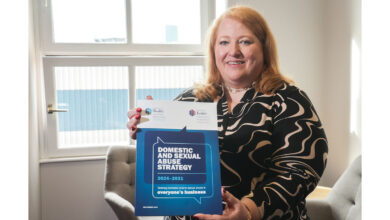Modernising the justice system

The £85 million Themis Programme is set to modernise service delivery across Northern Ireland Courts and Tribunals Service (NICTS).
Announced by Justice Minister Naomi Long MLA in September 2024, the programme marks a critical milestone in achieving the NICTS’s Vision 2030 goals of modernising the justice system, but its success hinges on effective implementation and addressing potential challenges.
Central to Themis is the creation of a digital-first, paper-light environment designed to streamline processes in civil, family, and criminal courts, while enhancing access to justice services.
The vision aligns closely with NICTS’s stated objectives to modernise the courts through integrated case management systems, online service portals, and digital tools. This includes a user-friendly web portal to allow citizens, legal professionals, and government partners to initiate and track cases online, ensuring greater accessibility and efficiency.
This approach mirrors Vision 2030’s emphasis on creating citizen-centric services, aiming to reduce reliance on physical hearings, and leveraging technology to deliver faster case resolutions.
In particular, the programme supports Vision 2030 goals such as e-bundling, digital evidence sharing, and remote hearings, setting the stage for a modern, responsive justice system.
While Themis represents a transformative step forward, several areas require careful attention to ensure alignment with the broader modernisation agenda:
• Accessibility: Vision 2030 prioritises inclusivity, ensuring services cater to vulnerable groups and those with limited access to digital tools. Themis must deliver digital solutions that are easy to use and supported by accessible alternatives, particularly for non-digital users.
• Infrastructure synergy: Modernising IT systems must go hand-in-hand with addressing physical estate challenges. Many court buildings are outdated and lack the flexibility to support hybrid services. Themis’s success will depend on integrating its digital ambitions with ongoing estate modernisation projects outlined in Vision 2030.
• Outcome measurement: Vision 2030 stresses the need for tangible improvements in user outcomes. Themis must incorporate clear performance metrics to evaluate its impact on efficiency, case progression, and public confidence.
• Collaborative design: Delivering a justice system that works for everyone requires meaningful collaboration with judiciary, legal professionals, and the public. Effective stakeholder engagement is critical to ensuring Themis meets the sector’s diverse needs.
The programme also offers opportunities to pilot cutting-edge solutions. AI-driven analytics, online mediation services, and diversionary options such as prosecutorial fines further aim to enhance justice delivery. These initiatives align with Vision 2030’s focus on proportionate resolutions and reducing unnecessary court appearances.
While Themis presents an opportunity to lead the way in digital justice, the success of the programme will depend on balancing technological advancements with the human-centric values articulated in Vision 2030.





